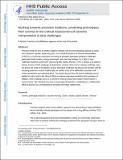Working toward precision medicine: Predicting phenotypes from exomes in the Critical Assessment of Genome Interpretation (CAGI) challenges
Author(s)
Daneshjou, Roxana; Wang, Yanran; Bromberg, Yana; Bovo, Samuele; Martelli, Pier L; Babbi, Giulia; Di Lena, Pietro; Casadio, Rita; Edwards, Matthew D; Gifford, David K; Jones, David T; Sundaram, Laksshman; Bhat, Rajendra; Li, Xiaolin; Pal, Lipika R.; Kundu, Kunal; Yin, Yizhou; Moult, John; Jiang, Yuxiang; Pejaver, Vikas; Pagel, Kymberleigh A.; Li, Biao; Mooney, Sean D.; Radivojac, Predrag; Shah, Sohela; Carraro, Marco; Gasparini, Alessandra; Leonardi, Emanuela; Giollo, Manuel; Ferrari, Carlo; Tosatto, Silvio C E; Bachar, Eran; Azaria, Johnathan R.; Ofran, Yanay; Unger, Ron; Niroula, Abhishek; Vihinen, Mauno; Chang, Billy; Wang, Maggie H; Franke, Andre; Petersen, Britt-Sabina; Pirooznia, Mehdi; Zandi, Peter; McCombie, Richard; Potash, James B; Altman, Russ; Klein, Teri E.; Hoskins, Roger; Repo, Susanna; Brenner, Steve E; Morgan, Alexander A; ... Show more Show less
DownloadAccepted version (2.625Mb)
Terms of use
Metadata
Show full item recordAbstract
Precision medicine aims to predict a patient's disease risk and best therapeutic options by using that individual's genetic sequencing data. The Critical Assessment of Genome Interpretation (CAGI) is a community experiment consisting of genotype–phenotype prediction challenges; participants build models, undergo assessment, and share key findings. For CAGI 4, three challenges involved using exome-sequencing data: Crohn's disease, bipolar disorder, and warfarin dosing. Previous CAGI challenges included prior versions of the Crohn's disease challenge. Here, we discuss the range of techniques used for phenotype prediction as well as the methods used for assessing predictive models. Additionally, we outline some of the difficulties associated with making predictions and evaluating them. The lessons learned from the exome challenges can be applied to both research and clinical efforts to improve phenotype prediction from genotype. In addition, these challenges serve as a vehicle for sharing clinical and research exome data in a secure manner with scientists who have a broad range of expertise, contributing to a collaborative effort to advance our understanding of genotype–phenotype relationships.
Date issued
2017-08Department
Massachusetts Institute of Technology. Computer Science and Artificial Intelligence LaboratoryJournal
Human Mutation
Publisher
Wiley
Citation
Daneshjou, Roxana et al. "Working toward precision medicine: Predicting phenotypes from exomes in the Critical Assessment of Genome Interpretation (CAGI) challenges." Human Mutation 38, 9 (September 2017): 1182-1192 © 2017 Wiley Periodicals, Inc.
Version: Author's final manuscript
ISSN
1098-1004